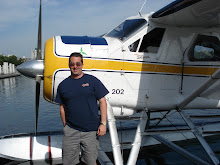Bgen Paul W Tibbets 1915-2007
Paul Tibbets was a brigadier general in the U.S. Air Force and is best
known for piloting the aircraft that dropped the atomic bomb Little Boy
on the Japanese city of Hiroshima, killing tens of thousands of people
and forcing the surrender of Japan. Little Boy was the first atomic bomb
to be used in the history of warfare
Tibbets, Jr. was born on February 23, 1915, in Quincy, Illinois, the son of Enola Gay and Paul Warfield Tibbets. He was at the controls of the Enola Gay on August 6, 1945, when the atomic bomb known as “Little Boy” was dropped on Hiroshima, Japan. Tens of thousands of people were instantly killed. Japan surrendered nine days later, ending World War II.In 1937, Tibbets enlisted as a flying cadet in the U.S. Army Air Corps at Fort Thomas, Kentuck . He was commissioned a second lieutenant in 1938 and received his wings at Kelly Air Force Base in Kelly Field, Texas.
During World War II, Tibbets was named commanding officer of the 340th Bomb Squadron, 97th Heavy Bomb Group flying B-17 Flying Fortresses He flew more than 25 combat missions over occupied Europe and led the first bombardment missions in support of the North African invasion in Algeria.
Tibbetts returned to the U.S. in March 1943 to test the combat capability of Boeing's new B-29 Super Fortress. In September 1944, he was placed in command of the newly form 509th Composite Group, whose mission was to drop the atomic bomb. He chose Wendover Air Base in Utah for the training.In March 1945, the 509th moved overseas to Tinian Island in the Marianas chain. On the afternoon of August 5, 1945, U.S. President Harry Truman gave his approval to use the weapons against Japan. At 2:45 a.m. on August 6, the Enola Gay, named after Tibbetts's mother, and its crew of 14 lifted off North Field en route to Hiroshima.
At exactly 8:15:15 a.m. the world's first atomic bomb exploded. The blast killed 70,000 to 100,000 people and wounded countless others. The course of history and the nature of warfare was changed forever. When the Enola Gay and her crew landed at Tinian at 2:58 p.m., they were greeted by General Carl Spaatz, a large contingent of brass, and a crowd of GIs. Spaatz decorated Tibbets with the Distinguished Service Cross and the other crew members with Air Medals.
Three days later, the U.S. dropped a second atomic bomb on Nagasaki, Japan, killing an estimated 40,000 people. The Japanese surrendered six days later, ending World War II. In 1959, Col. Tibbets was promoted to Brigadier General. He retired from the U.S. Air Force on August 31, 1966.
In the 1960s, Tibbets was posted as military attaché in India, but this posting was rescinded after all political parties in India protested his presence. In 1976, he and his wife, Andrea,;moved to Columbus, where he was president of Executive Jet Aviation, an air taxi company, until he retired in 1985.
Paul Tibbets, pilot and commander of the B-29 that dropped the first atomic weapon used in war, died on November 1, 2007.
Tibbets, Jr. was born on February 23, 1915, in Quincy, Illinois, the son of Enola Gay and Paul Warfield Tibbets. He was at the controls of the Enola Gay on August 6, 1945, when the atomic bomb known as “Little Boy” was dropped on Hiroshima, Japan. Tens of thousands of people were instantly killed. Japan surrendered nine days later, ending World War II.In 1937, Tibbets enlisted as a flying cadet in the U.S. Army Air Corps at Fort Thomas, Kentuck . He was commissioned a second lieutenant in 1938 and received his wings at Kelly Air Force Base in Kelly Field, Texas.
During World War II, Tibbets was named commanding officer of the 340th Bomb Squadron, 97th Heavy Bomb Group flying B-17 Flying Fortresses He flew more than 25 combat missions over occupied Europe and led the first bombardment missions in support of the North African invasion in Algeria.
Tibbetts returned to the U.S. in March 1943 to test the combat capability of Boeing's new B-29 Super Fortress. In September 1944, he was placed in command of the newly form 509th Composite Group, whose mission was to drop the atomic bomb. He chose Wendover Air Base in Utah for the training.In March 1945, the 509th moved overseas to Tinian Island in the Marianas chain. On the afternoon of August 5, 1945, U.S. President Harry Truman gave his approval to use the weapons against Japan. At 2:45 a.m. on August 6, the Enola Gay, named after Tibbetts's mother, and its crew of 14 lifted off North Field en route to Hiroshima.
At exactly 8:15:15 a.m. the world's first atomic bomb exploded. The blast killed 70,000 to 100,000 people and wounded countless others. The course of history and the nature of warfare was changed forever. When the Enola Gay and her crew landed at Tinian at 2:58 p.m., they were greeted by General Carl Spaatz, a large contingent of brass, and a crowd of GIs. Spaatz decorated Tibbets with the Distinguished Service Cross and the other crew members with Air Medals.
Three days later, the U.S. dropped a second atomic bomb on Nagasaki, Japan, killing an estimated 40,000 people. The Japanese surrendered six days later, ending World War II. In 1959, Col. Tibbets was promoted to Brigadier General. He retired from the U.S. Air Force on August 31, 1966.
In the 1960s, Tibbets was posted as military attaché in India, but this posting was rescinded after all political parties in India protested his presence. In 1976, he and his wife, Andrea,;moved to Columbus, where he was president of Executive Jet Aviation, an air taxi company, until he retired in 1985.
Paul Tibbets, pilot and commander of the B-29 that dropped the first atomic weapon used in war, died on November 1, 2007.




<< Home